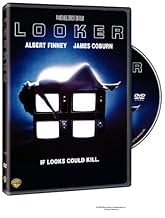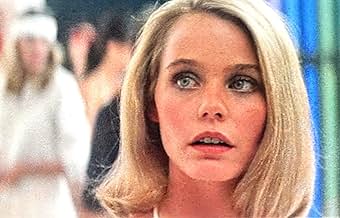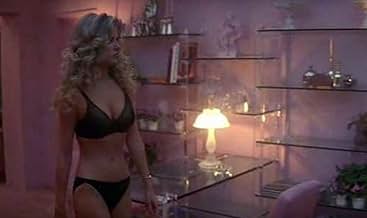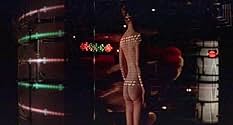CALIFICACIÓN DE IMDb
6.1/10
6.6 k
TU CALIFICACIÓN
Un cirujano plástico de Beverly Hills (Albert Finney) es el sospechoso de una trama criminal porque todas las modelos que opera aparecen muertas en misteriosas circunstancias.Un cirujano plástico de Beverly Hills (Albert Finney) es el sospechoso de una trama criminal porque todas las modelos que opera aparecen muertas en misteriosas circunstancias.Un cirujano plástico de Beverly Hills (Albert Finney) es el sospechoso de una trama criminal porque todas las modelos que opera aparecen muertas en misteriosas circunstancias.
- Dirección
- Guionista
- Elenco
- Premios
- 1 premio ganado y 1 nominación en total
Michael Hawkins
- Senator Robert Harrison
- (as Michael Gainsborough)
Donna Kei Benz
- Ellen
- (as Donna Benz)
Terrence E. McNally
- Technician in Scanning Room
- (as Terrence McNally)
- Dirección
- Guionista
- Todo el elenco y el equipo
- Producción, taquilla y más en IMDbPro
Opiniones destacadas
Nearing its 20th birthday, "Looker" still holds up today as a solid techno-thriller. Expertly tucking a government/industrial conspiracy beneath a blanket of computer-phobic tension, the film manages to predate the success of the "X-Files" before cyberspace became a household word.
Finney and Coburn are subtly superb in their roles, while Crichton (unintentionally) satirizes a media-saturated culture ripe for the string-pulling. Barry De Vorzon's score is hauntingly impressive (and sadly, unavailable in soundtrack form) as is the cheesy 80's title track performed by Sue Saad (later covered by Kim Carnes on her "Voyeur" album).
People have slammed the script for its lack of explanation... however, a 15-minute scene depicting a rather detailed "summing up" of the plot was deleted from the theatrical/home video cut, but did make the film's network TV airings. With or without the scene, the film is an often-overlooked gem I would strongly recommend to anyone in the mood for a slick, sci-fi thriller.
Finney and Coburn are subtly superb in their roles, while Crichton (unintentionally) satirizes a media-saturated culture ripe for the string-pulling. Barry De Vorzon's score is hauntingly impressive (and sadly, unavailable in soundtrack form) as is the cheesy 80's title track performed by Sue Saad (later covered by Kim Carnes on her "Voyeur" album).
People have slammed the script for its lack of explanation... however, a 15-minute scene depicting a rather detailed "summing up" of the plot was deleted from the theatrical/home video cut, but did make the film's network TV airings. With or without the scene, the film is an often-overlooked gem I would strongly recommend to anyone in the mood for a slick, sci-fi thriller.
You can take Michael Crichton's Looker, a way-back-then-high tech thriller with a media-industrial complex, one of two ways. Either it's an interesting preview of computer graphics being used for nefarious advertising gain, with a crime mystery to solve or it's a clumsily acted and directed story of how James Coburn is out to slaughter Albert Finney and Susan Dey using all sorts of out-of-this-world gizmos and tactics.
Personally, I think it's both.
Much like Crichton's Westworld, the movie depends heavily on the computer arts to fill in for substance, and like Westworld, it succeeds. Looker is a pleasant and exciting little period piece, a time capsule for what science and advertising might be heading toward in the not too distant future.
To be fair to yourself, you must forgive the creaky performances by Finney, Dey, and Coburn (plus everyone else). It's the combination of guns, girls, and gadgets that keep the story moving (Crichton gets your attention at the very start by introducing a television lovely asking plastic surgeon Finney to alter her in strangely precise details; then you get the pre-surgery mugshots of the girl with her supposed imperfections--and what imperfections!--in full view). It's cheap and creepy, but everyone in the theater was hooked instantly by the looker on screen.
Don't look too closely, though. The plot holes are big and numerous, so thinking is not recommended. It's the flash-attachments-on-steroids that cause catatonia and the computer mapping of Susan Dey, standing there with her imperfections exposed, that keep you interested. It's strange--I've always liked Dey's looks and I'm not about to complain about seeing her in the all-together, but the bloodlessness of computers, their soul-less nature robs the scene of its prurient nature.
Crichton has hit upon something here. Computers make us so nervous, even a quarter century later, that the use of a story of cynical cyber-manipulation of consumers robs the viewer of getting his or her jollies out of seeing good-looking people nekked or in danger or both. In some ways it robs us of our interest in the human drama that movies depend on to be of lasting quality. It's a double edged sword, but it's both subtle and very effective.
In general, Looker isn't subtle, nor is it a wholly satisfying entertainment, but it does deserve a look.
Personally, I think it's both.
Much like Crichton's Westworld, the movie depends heavily on the computer arts to fill in for substance, and like Westworld, it succeeds. Looker is a pleasant and exciting little period piece, a time capsule for what science and advertising might be heading toward in the not too distant future.
To be fair to yourself, you must forgive the creaky performances by Finney, Dey, and Coburn (plus everyone else). It's the combination of guns, girls, and gadgets that keep the story moving (Crichton gets your attention at the very start by introducing a television lovely asking plastic surgeon Finney to alter her in strangely precise details; then you get the pre-surgery mugshots of the girl with her supposed imperfections--and what imperfections!--in full view). It's cheap and creepy, but everyone in the theater was hooked instantly by the looker on screen.
Don't look too closely, though. The plot holes are big and numerous, so thinking is not recommended. It's the flash-attachments-on-steroids that cause catatonia and the computer mapping of Susan Dey, standing there with her imperfections exposed, that keep you interested. It's strange--I've always liked Dey's looks and I'm not about to complain about seeing her in the all-together, but the bloodlessness of computers, their soul-less nature robs the scene of its prurient nature.
Crichton has hit upon something here. Computers make us so nervous, even a quarter century later, that the use of a story of cynical cyber-manipulation of consumers robs the viewer of getting his or her jollies out of seeing good-looking people nekked or in danger or both. In some ways it robs us of our interest in the human drama that movies depend on to be of lasting quality. It's a double edged sword, but it's both subtle and very effective.
In general, Looker isn't subtle, nor is it a wholly satisfying entertainment, but it does deserve a look.
A plastic surgeon gets suspicious when the police question him about the death of a model he's worked on, and learns that all the models he's worked on who came in with "shopping lists" of miniscule changes that "had to be fixed, so I could be perfect," are dead. Susan Day has just come in with a list of her own, and he decides to keep an eye on her - and learns of a plot to use computer generated images made from detailed electronic measurements of the models to replace live models for commercials and acting. One bonus is about 3 minutes of Susan Day being measured, sans clothing. Let's face it, every boy who grew up watching "The Partridge Family" dreamed of the chance to see her like this! (The nudity is handled tastefully - there's nothing graphic.)
Plastic surgeon in Los Angeles investigates after some of his most beautiful clients--all fashion models--turn up dead. Thriller has a now-dated design but a terrific set-up. Writer-director Michael Crichton keeps his premise absorbing and exciting for about a third of its length, though he later resorts to assembly-line action, ending the picture on a whimper. Albert Finney just fine in the lead, Susan Dey terrific as his sidekick, yet the characters themselves are rather one-dimensional. Strictly as a time-filler, not bad. **1/2 from ****
Dr. Larry Roberts (Albert Finney) is a top Beverly Hills plastic surgeon who finds himself embroiled in a sinister mind-control conspiracy. After three of his patients are killed in suspicious circumstances, Larry takes it upon himself to protect the apparent next victim, Cindy (the beautiful Susan Dey) and also solve the mystery.
Looker' is possibly director Michael Crichton's most criminally underrated film. Admittedly the screenplay often leaves a lot to be desired but the initial premise is both intriguing and fear-provoking. Crichton's script makes some rather fascinating, and in hindsight rather perceptive, comments about how corporations can abuse both the media and the general public simply through the use of television. Towards the end a particularly pertinent speech is made by John Reaston (James Coburn) on how the general public is willing to submit automatically to the enormous power that television possesses. However, much of the power that Looker' could have potentially possessed is lost with poor pacing, inappropriate and unrealistic dialogue and a couple of major plot-holes. In fact, some eminent questions remain unanswered and the movie ends on a sort of anti-climatic note.
Crichton's direction appears to be somewhat disjointed as the pace of the movie alternates constantly. To begin with Looker' has the correct proportion of suspense to action and is quite thrilling to behold. Unfortunately, certain scenes such as a car chase drag on and become somewhat tedious. One particular sequence of events towards the end of the movie drags on for fifteen minutes and while to begin with is compellingly suspenseful, the sequence begins to feel old and certainly spoils what could have been an effective ending. Looker' also suffers from some particular bland performances, particularly from central actor Albert Finney. His performance was predominantly lacklustre and featured uninspired sequences in which Finney would avoid gunfire by unenthusiastically throwing himself across the floor. That being said Finney did seem to fit the role of Larry Roberts and was fairly entertaining to watch. Susan Dey and James Coburn were both enjoyable in their respective roles and one wonders why more was not done with their characters. Had more time been spent trying to develop these characters then maybe something more could have been done with the movie.
Surprisingly, despite all its flaws Looker' is still somewhat compelling. It is certainly not Crichton's best film but is still vastly underrated in my opinion. The opening sequence is suspenseful and intriguing which is occasionally echoed throughout the rest of the movie, though unfortunately not enough. Looker' is blessed with some wickedly delightful black humour, particularly towards the end and a bizarre, yet mesmerizing, electric musical score from Barry de Vorzon. Some fans will be happy to know that there are unnecessary scenes of full frontal nudity, including one from Susan Dey. The humorous overtones of that particular scene undoubtedly shine through. The ideas of hypnotic and subliminal messaging are what make Looker' compelling even though the film is still heavily damaged by the lack of decent characterisation and storytelling. I think Looker' is worth watching but is most certainly not to everyone's taste. My rating for Looker' 6.5/10.
Looker' is possibly director Michael Crichton's most criminally underrated film. Admittedly the screenplay often leaves a lot to be desired but the initial premise is both intriguing and fear-provoking. Crichton's script makes some rather fascinating, and in hindsight rather perceptive, comments about how corporations can abuse both the media and the general public simply through the use of television. Towards the end a particularly pertinent speech is made by John Reaston (James Coburn) on how the general public is willing to submit automatically to the enormous power that television possesses. However, much of the power that Looker' could have potentially possessed is lost with poor pacing, inappropriate and unrealistic dialogue and a couple of major plot-holes. In fact, some eminent questions remain unanswered and the movie ends on a sort of anti-climatic note.
Crichton's direction appears to be somewhat disjointed as the pace of the movie alternates constantly. To begin with Looker' has the correct proportion of suspense to action and is quite thrilling to behold. Unfortunately, certain scenes such as a car chase drag on and become somewhat tedious. One particular sequence of events towards the end of the movie drags on for fifteen minutes and while to begin with is compellingly suspenseful, the sequence begins to feel old and certainly spoils what could have been an effective ending. Looker' also suffers from some particular bland performances, particularly from central actor Albert Finney. His performance was predominantly lacklustre and featured uninspired sequences in which Finney would avoid gunfire by unenthusiastically throwing himself across the floor. That being said Finney did seem to fit the role of Larry Roberts and was fairly entertaining to watch. Susan Dey and James Coburn were both enjoyable in their respective roles and one wonders why more was not done with their characters. Had more time been spent trying to develop these characters then maybe something more could have been done with the movie.
Surprisingly, despite all its flaws Looker' is still somewhat compelling. It is certainly not Crichton's best film but is still vastly underrated in my opinion. The opening sequence is suspenseful and intriguing which is occasionally echoed throughout the rest of the movie, though unfortunately not enough. Looker' is blessed with some wickedly delightful black humour, particularly towards the end and a bizarre, yet mesmerizing, electric musical score from Barry de Vorzon. Some fans will be happy to know that there are unnecessary scenes of full frontal nudity, including one from Susan Dey. The humorous overtones of that particular scene undoubtedly shine through. The ideas of hypnotic and subliminal messaging are what make Looker' compelling even though the film is still heavily damaged by the lack of decent characterisation and storytelling. I think Looker' is worth watching but is most certainly not to everyone's taste. My rating for Looker' 6.5/10.
¿Sabías que…?
- TriviaThe first ever film to create 3D shading with a computer that produced the first ever CGI human character was the model Cindy (Susan Dey). This movie achieved this feat before Disney's more famous Tron (1982) hit the screens. The Web site Filmsite said of Cindy: "Her digitization was visualized by a computer-generated simulation of her body being scanned--notably the first use of shaded 3D CGI in a feature film. Polygonal models obtained by digitizing a human body were used to render the effects."
- ErroresAt the conference near the end, when Dr. Larry Roberts is disguised as a security guard, during several sequences getting in and out of elevators the wound on the side of his mouth disappears and reappears.
- Citas
Cindy Fairmont: Hi. I'm Cindy. I'm the perfect female type: 18 to 25. I'm here to sell for you.
- Versiones alternativasThe broadcast television version contains additional footage, including a scene where Reston (James Coburn) explains to Dr. Roberts (Albert Finney and Cindy ('Susan Dey') why Digital Matrix had the "perfect" models killed.
- ConexionesFeatured in Room 237 (2012)
Selecciones populares
Inicia sesión para calificar y agrega a la lista de videos para obtener recomendaciones personalizadas
- How long is Looker?Con tecnología de Alexa
Detalles
- Fecha de lanzamiento
- País de origen
- Idioma
- También se conoce como
- Looker
- Locaciones de filmación
- Art Center College of Design, Pasadena, California, Estados Unidos(Interiors and exteriors. As 'Digital Matrix Inc.' headquarters building.)
- Productoras
- Ver más créditos de la compañía en IMDbPro
Taquilla
- Presupuesto
- USD 8,000,000 (estimado)
- Tiempo de ejecución1 hora 33 minutos
- Color
- Mezcla de sonido
- Relación de aspecto
- 2.39 : 1
Contribuir a esta página
Sugiere una edición o agrega el contenido que falta

Principales brechas de datos
By what name was Las víctimas (1981) officially released in India in English?
Responda
































